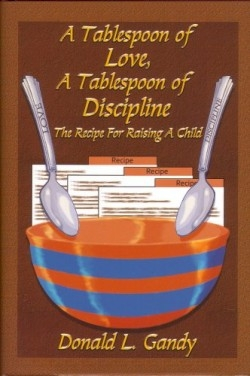
A Tablespoon of Love, A Tablespoon of Discipline
The Recipe for Raising a Child
The youngest generation tends to get the blame for the world’s worst social economic and political ills. In his book A Tablespoon of Love A Tablespoon of Discipline Donald L. Gandy lifts the fault from the shoulders of the young and plants it squarely on the conscience of the parents. He cites the last three generations for negligent parenting and points to leniency and a degradation of family morality as the reasons behind “today’s homeless mentally unbalanced drug dependent crack babies unwed mothers welfare dependents abandoned children jail inmates functional illiterates ‘ADHD’ children and other physically and mentally maladjusted individuals.”
Using his own daughter as an example of the results to be gleaned from what he terms “successful parenting” Gandy leads the reader through 15 chapters of parenting advice with headings like “Bend the Tree With Love and Discipline” and “Buy Them the Right Toys for Life’s Conditioning.” Gandy champions techniques such as physical punishment tough love and habitual cleanliness. He exhorts today’s parents to buy developmentally appropriate toys and puzzles to remain unified as a parental team and to teach children respect for others and for themselves.
Many of Gandy’s proposals are rooted in common sense. However his tone makes it difficult to feel open to receiving his advice. The book might appeal to readers who currently follow his prescribed guidelines but parents who already have their own styles and ideas may be offended by the inherent judgment evident in his narrative. He says for example “The procedure that allows too much input from the child in the nurturing process has proven to be a dismal failure because a child has no knowledge or hands-on experience about life and raising a child.” Nothing in that statement invites a skeptical reader to accept Gandy’s authority on parenting.
Another detraction from Gandy’s message is his tendency to overwrite. His prose is technically correct yet his lines become convoluted with extraneous phrasing. Here for instance he says “As parents in successfully raising a child you will be dealing with shaping and directing the child through and around the challenges encountered in the process of growing up and in handling those challenges in such a way as to make them work for the child’s benefit or to prevent them from working in such a way as to get the child off of life’s main course.” Gandy’s book would be more accessible if he were to work towards a more cohesive writing style.
Gandy is admirably passionate about his quest to teach proper parenting; his arguments are heartfelt and delivered with sincerity. He backs much of his advice with quotes from the Bible. It’s reassuring to know there are people thinking hard about the current state of American children. Hopefully his next attempt to influence the parenting population will be more welcoming and less critical of people who are doing the best they can.
Reviewed by
Andi Diehn
Disclosure: This article is not an endorsement, but a review. The publisher of this book provided free copies of the book and paid a small fee to have their book reviewed by a professional reviewer. Foreword Reviews and Clarion Reviews make no guarantee that the publisher will receive a positive review. Foreword Magazine, Inc. is disclosing this in accordance with the Federal Trade Commission’s 16 CFR, Part 255.
